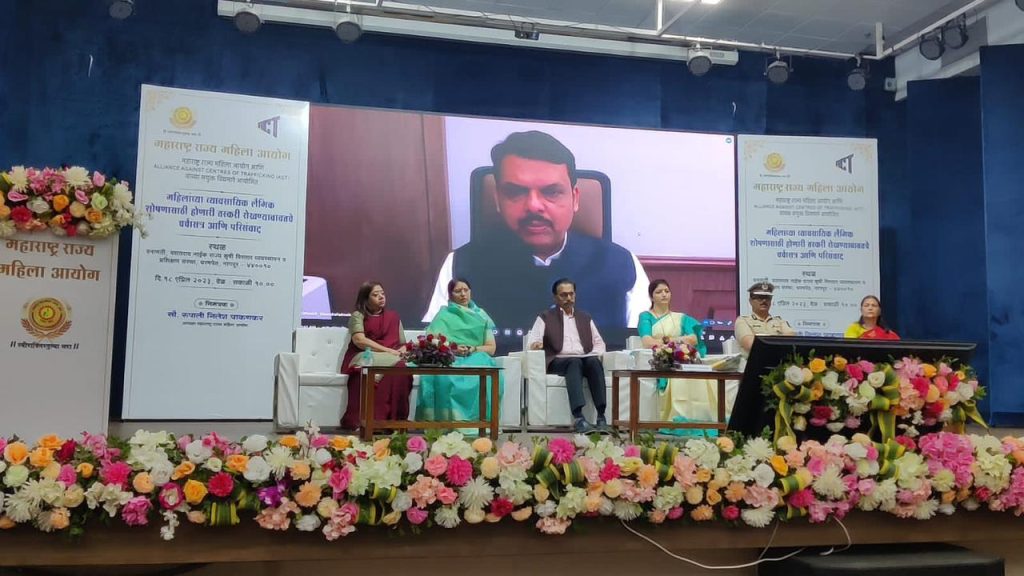“Human trafficking is perilous than murder. This is a bigger organized crime than the drug trade. A strong social movement backed by judicial system is required to curb this ‘crime beyond boundaries’ and this subject is on the priorities of the state government.” Said deputy chief minister Devendra Fadnavis while virtually addressing a panel discussion as the chief guest on the subject ‘Prevention of the Commercial Sex Trafficking of women’ organized by the Maharashtra State Commission for Women in partnership with Alliance Against Centers for Trafficking (ACT) Coalition.
The first one of the six proposed symposiums across the state by MSCW concluded at Vanamati on Tuesday. Maharashtra State Commission for Women has forged a partnership with the Alliance Against Centers for Trafficking (ACT) Coalition to counter human trafficking. Hailing the symposium, Fadnavis expressed the need of collaboration of different government departments and the NGOs.
A provision has been made for fifty ‘shakti sadans’ across the state in the budget recently, he added.


Rupali Chakankar, the Convener of the symposium and the chairman of Maharashtra State Commission for Women, Amitesh Kumar, Commissioner of Police, Nagpur, Dr. P. M. Nair, IPS (Retd.) and Nandini Thakkar, Legal Head, AHT Initiatives, Vipla Foundation addressed the symposium. Speaking earlier, Abha Pandey, Member, MSCW shed the light on the issue and this initiative. Aparna Kolhe, Div. Deputy Commissioner, WCD Nagpur Div. was present on the dias. The consultation has agreed to establish multidisciplinary committees at the district level, led by MSCW, to counter human trafficking and strengthen the prosecution of traffickers.
“Sex trafficking is a severe problem worldwide, affecting women and children the most. It is often driven by organized criminal networks that exploit vulnerable individuals for profit. The joint effort by the MSCW and ACT is a positive step towards countering sex trafficking as an organized force in a multi-faceted manner, involving multiple stakeholders.” Said Rupali Chakankar, Chairperson, MSCW while addressing.
Nagpur and Amravati are high-risk areas for trafficking. Nagpur’s central location and extensive transport network make it a hotbed of trafficking. In recent times, Amravati has witnessed an increase in trafficking, particularly online trafficking for sexual exploitation, which is difficult to detect and prevent. While brainstorming on ensuring the secure environment in these districts for women and children, Dr. P. M. Nair suggested coordinated efforts from multiple stakeholders, including government agencies, civil society organizations, and the general public.
The subject-specific panels comprising subject matter experts focused on the emerging trends in sex trafficking, including the use of technology and social media, especially in the post-pandemic era. Improving implementation of existing laws is imperative to create a more responsive justice system. The ultimate goal is to encourage survivors to participate in supporting the prosecution and bringing perpetrators to justice, the panel highlighted.
“Trafficking is the oldest form of exploitation, don’t call it profession.” Said Nandini Thakkar while highlighting the need of Collective Impact Approach to reduce the victim’s vulnerability to re-trafficking. The Alliance Against Centers of Trafficking (ACT), a coalition of five NGOs – Vipla Foundation, Pratham, Prakruthi, Yuva Rural Association, and Freedom Firm – works to fight crimes against women and children, particularly human trafficking.
👉 Click here to read the latest Gujarat news on TheLiveAhmedabad.com



